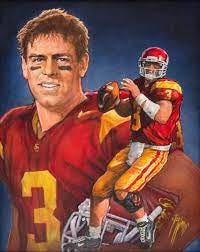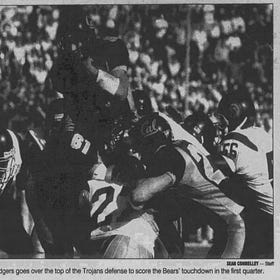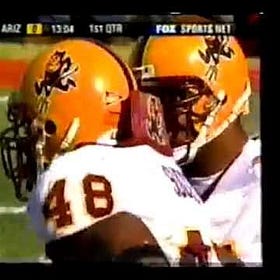Week 7 in the Pac-12 encapsulated why this is such a special season for the conference: Heisman Trophy contenders Michael Penix Jr. and D.J. Uiagalelei shining in wildly entertaining contests; a recently downtrodden Arizona program scoring an emphatic win on the road at Washington State; a comeback for the ages with Stanford’s 29-0 halftime rally marking the biggest turnaround in Cardinal program history.
Before diving into this edition of Pac-12 Tuesday, allow me to direct you to a couple of reads from or pertaining to Week 7: First, Kyle Bonagura’s ESPN.com dispatch from Montlake and Washington’s thrilling, 36-33 defeat of rival Oregon nicely captures Penix’s essence as Huskies quarterback and Heisman front-runner.
Even as praise rolls in for Penix, his college career could be deemed underrated. He led Indiana to Big Ten title contention in 2020. His arrival at Washington — coinciding with head coach Kalen DeBoer and offensive coordinator Ryan Grubb — transformed a Huskies offense that was downright putrid at the end of Jimmy Lake’s tenure into perhaps the most dangerous attack in the nation.
Second, longtime readers of The Press Break know my affinity for plugging my own work and now is no exception: Arizona’s 44-6 deconstruction of Washington State provided a fitting progress report for my Arizona Daily Star preseason feature on the rebuild of the Wildcats defense.
UA’s 4-3 record isn’t necessarily the most impressive mark when viewed without context. But given both the program’s dismal play since Rich Rodriguez’s ouster following the 2017 season, coupled with Arizona’s performance even in losses, Jedd Fisch has overseen one of the most impressive turnarounds in all of college football.
The Wildcats defense was consistently porous dating back even to some of Rich Rod’s more successful teams. Arizona’s best defense in the Rodriguez years was a byproduct of linebacker Scooby Wright having an individual season worthy of Heisman consideration.
And even with Two-Star Scoob delivering one of the most remarkable seasons I’ve ever seen from a college linebacker, the 2014 Arizona defense surrendered eight points more per game than the current Wildcats’ 20.6-per yield.
Completing shutting down a Washington State offense that had mostly been cruising this season and that boasted a Heisman hopeful in quarterback Cam Ward is an obvious highlight for the UA defense. However, in the three losses, the defense gave the Wildcats a chance to win at Mississippi State despite five first-half turnovers; held Washington to its season-low, 31 points; and gave up 28 points in regulation to a USC offense that, even after losing to Notre Dame, is still averaging almost 44 per game.
Two incredible turnarounds on opposite sides of the ball underscore college football’s greatness. Teams can evolve so much from season-to-season with just a few changes.
Onto this week’s subject, a friend of The Press Break messaged me this past weekend with a question that got me thinking: What was the best Pac-10/12 season before this incredible 2023 campaign?
Now, the answer’s wholly subjective. To that end, I would love to read other opinions and am thus asking you to *in my best Lee “Hacksaw” Hamilton voice* SOUND OFF!
The answer for me is 2002, edging an outstanding 2008. The conference never had more parity in my years following it than 2002, when 8-of-10 teams finished with seven or more wins. Five of those reached eight wins, and co-conference champions Washington State and USC both hit 10 wins.
The Cougars and Trojans also both received invites to the Bowl Championship Series. Washington State earned the Rose Bowl bid by virtue of beating USC head-to-head in one of the all-time great Pac-10/12 games of the 21st Century.
Revisiting this game, I’m reminded what a terrific job TBS did with its prime-time college football broadcasts in the early 2000s. The former Turner networks set the standard for NBA coverage still today, have handled their share of March Madness broadcasts with love and affection, and give the NHL a big-time feel the league’s lacked.
That’s all to say I desperately wish Warner Bros. Discovery got back into the college football racket, but really wish it had done so in time to save the Pac-12.
Anyway, Washington State won a 30-27, overtime thriller on the Palouse aired nationally on TBS. Jason Gesser and Carson Palmer, two of the best quarterbacks in the nation that season, produced similar numbers: Palmer threw for 382 yards and two touchdowns with a pick, while Gesser passed for 312 yards, two touchdowns and a pick.
Washington State’s rush defense ultimately made the difference, however, limiting USC to a net of 72 yards thanks in part to sacking Palmer four times. Rien Long accounted for two, half of his four total tackles for loss.
The defeat was part of a turbulent first month in Pete Carroll’s second season on the job. The Trojans opened with a 24-17 win over Auburn, kicking off a dominant stretch for USC in its matchups against SEC competition.
SC followed up with a 40-3 blasting of defending Big 12 champion Colorado. That win was part of a big weekend for the Los Angeles schools against the Centennial State, as UCLA beat a Colorado State squad that went on to win the Mountain West Conference championship and peaked at No. 16 in the AP Poll.
The Trojans went 1-2 over their next three, however, falling at Kansas State two weeks prior to the overtime setback at Washington State.
USC didn’t lose again for the rest of the season, however, and a dynasty came into form each Saturday. The winning streak began with the first entry into an exciting trilogy against Cal.
Cal’s win in 2003, ostensibly denying USC a place in the BCS Championship Game, and the next year’s Golden Bears near-miss, garner far more attention two decades later.
Pac-12 Tuesday: The Golden Bear Effect - How A Cal Win Over USC Changed Everything
The 108th and hopefully-not-final season of Pac-12 Conference football kicks off this Saturday when USC hosts San Jose State. In recognition of the league’s illustrious lineage and in preparation for an uncertain future, I am dedicating this space each Tuesday throughout the football and basketball seasons to a memorable moment from its history.
The 2002 meeting between Carroll and Jeff Tedford’s teams was every bit as exciting, however, and in some ways as significant. USC rallied from a 21-3 deficit, staring down its third loss in four games.
Such a dismal stretch midway through a season with lofty preseason expectations could have been detrimental to the growth of a program under a head coach in Carroll whose hire was met with considerable skepticism. At the very least, it would have denied USC its bid to the Orange Bowl, in which a thorough beatdown of Iowa launched the Trojans dynasty on the national stage.
USC answered with 27 unanswered points, beginning with a pair of Palmer touchdown passes in the final 5:29 of the first half.
The 30-28 Trojans win is notable both as a turning point that ignited an eight-game winning streak to close out 2002, and because it was the last time for the rest of the season an opponent played USC to within a one-possession margin.
The Trojans pounded all comers the rest of the way by at least 11 points, capped on Thanksgiving weekend with a 44-13 rout of rival Notre Dame in what was essentially an Orange Bowl play-in.
What’s more, this game doubled as Carson Palmer’s Heisman audition. The 2002 Heisman race featured plenty of deserving finalists, with Palmer’s counterpart in the Orange Bowl — Iowa quarterback Brad Banks — leading the way.
Throwing for 425 yards and four touchdowns on a nationally televised broadcast of No. 6 vs. No. 7 was about as perfect of a closing argument as Palmer could make. That, coupled with Banks splitting the Big Ten vote as a result of Penn State running back Larry Johnson being in the Heisman hunt, won Palmer the award.
Palmer was not only the first Pac-10 recipient of the Heisman in my time following college football, but the conference’s first winner in my lifetime.
All the more incredible, one could argue — and I have on this very newsletter — Palmer wasn’t even the best Pac-10 player that season.
That distinction belonged to Arizona State defensive end Terrell Suggs. Subjectively speaking.
The Egregious Terrell Suggs Heisman Snub
A necessary disclaimer to the following: I know caring about the Heisman is considered gauche and/or cringe in this era of haughty college football punditry. Nevertheless, I cannot let go of my childlike attachment to what the Heisman is meant to symbolize. To quote one of America’s great philosophers: IT’S STILL REAL TO ME, DAMMIT!
Much like the aforementioned Scooby Wright did 12 years later and about 100 miles further south, Suggs produced an individual season that ranks among the very best I’ve ever witnessed.
I became a self-professed expert of Heisman belly-aching a year earlier when another Pac-10 contender, Oregon quarterback Joey Harrington, finished fourth in the balloting. With Nebraska’s Eric Crouch winning the 2001 award, it only dumped further salt into a fresh wound drawn when the Cornhuskers skipped the Ducks for the BCS Championship Game.
Coming on the heels of Oregon’s dual-slight in 2001, Palmer’s Heisman win and the Pac-10’s collective success in 2002 solidified it as my favorite season in the conference’s history.





